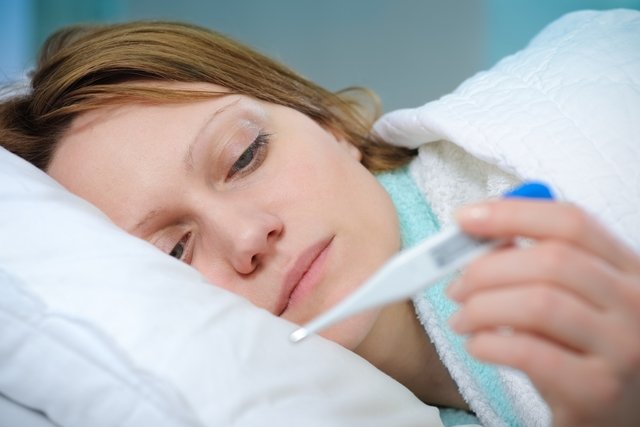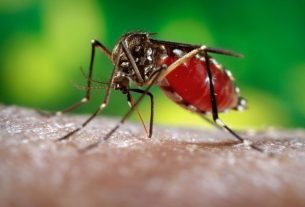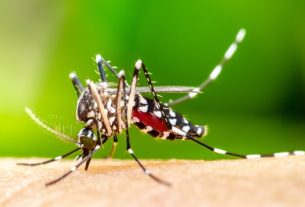To alleviate the discomfort of dengue fever, there are some strategies or remedies that can be used to combat symptoms and promote well-being, without the need to take medication.
Therefore, it may be interesting to place a wet compress with cold water on your forehead, drink plenty of fluids during the day, avoid fatty foods, apply ointments to your skin in case of itching, and apply a chamomile tea compress to your eyelids in case of pain in your eyes. eyes, for example.
Typically, these precautions are used to alleviate the symptoms of fever, vomiting, itching and pain in the eyes, which are the main symptoms caused by dengue. Find out more about the symptoms of dengue.
What to do
Some tips on what to do at home to alleviate dengue symptoms are:
1. How to relieve a fever
Some tips that can help reduce dengue fever include:
- Place a wet compress with cold water on your forehead for 15 minutes;
- Remove excess clothing, avoiding being covered by very hot blankets, for example;
- Take a bath in warm water, that is, neither hot nor cold, 2 to 3 times a day.
If these measures do not work, you can take medicine for fever, such as paracetamol or dipyrone, for example, but only under the guidance of your doctor. See more about dengue treatment.
2. How to stop nausea
In cases where dengue causes constant nausea and vomiting, some tips are:
- Suck on a lemon or orange popsicle;
- Avoid fatty foods or foods with a lot of sugar;
- Drink chamomile or peppermint tea;
- Eat every 3 hours and in small quantities;
- Avoid alcoholic drinks;
- Drink a minimum of 1.5 to 2 liters of water per day;
If, despite these measures, the person continues to experience nausea or vomiting, they can take anti-nausea medications, such as metoclopramide, bromopride and domperidone, under medical supervision.
3. How to relieve itchy skin
To relieve itchy skin, which appears in the first 3 days after dengue infection, good options are:
- Take a cold water shower;
- Apply cold compresses to the affected area;
- Apply compresses soaked in lavender or lavender tea;
- Apply ointments for itchy skin, such as Polaramine, for example.
Allergy medicines such as desloratadine, cetirizine, hydroxyzine and dexchlorpheniramine can also be used, but only under medical advice.
4. How to relieve eye pain
In case of eye pain, some tips are:
- Wear sunglasses, even indoors;
- Apply compresses soaked in chamomile tea to the eyelids for 10 to 15 minutes;
- Take painkillers, such as paracetamol and dipyrone, as directed by your doctor;
During treatment for dengue fever, you should avoid taking non-hormonal anti-inflammatory medications, such as aspirin, as they increase the chances of bleeding.
When to go to the doctor
In the presence of other more serious symptoms, such as bruising, bloody urine or bleeding from the nose, gums or eyes, it is recommended to go to the emergency room as they may indicate hemorrhagic dengue fever.
Read too: Dengue hemorrhagic fever: what it is, symptoms, causes and treatment
When experiencing symptoms such as intense abdominal pain, yellowish color in the skin and eyes and poor digestion, you should also go to the hospital quickly, as this may indicate liver impairment, which, in some cases, is related to fulminant hepatitis. In addition to care during dengue, it is also important to take other precautions that help prevent the disease.
Bibliography
- REGIONAL PHARMACY COUNCIL OF THE STATE OF SÃO PAULO. Pharmacist Guidance Manual: Dengue, Zika and Chikungunya. 2016. Available at: <https://portal.crfsp.org.br/documentos/dengue/Manual%20do%20Farmaceutico.pdf>. Accessed on February 2, 2024
- NATIONAL HEALTH SURVEILLANCE AGENCY – ANVISA. Phytotherapeutic form: Brazilian pharmacopoeia 2nd edition. 2021. Available at: <https://www.gov.br/anvisa/pt-br/assuntos/farmacopeia/formulario-fitoterapico/arquivos/2021-fffb2-final-c-capa2.pdf>. Accessed on February 2, 2024
- CDC . Dengue: symptoms and treatment. Available at: <https://www.cdc.gov/dengue/symptoms/index.html>. Accessed on February 2, 2024
- CENTERS FOS DISEASE CONTROL AND PREVENTION. Caring for a Child or Family Member Sick with Dengue. Available at: <https://www.cdc.gov/dengue/symptoms/family.html>. Accessed on February 2, 2024
- STATPEARLS. Dengue Fever. Available at: <https://www.ncbi.nlm.nih.gov/books/NBK430732/>. Accessed on February 2, 2024

Sign up for our newsletter and stay up to date with exclusive news
that can transform your routine!
Warning: Undefined array key "title" in /home/storelat/public_html/wp-content/plugins/link-whisper-premium/templates/frontend/related-posts.php on line 12
Warning: Undefined array key "title_tag" in /home/storelat/public_html/wp-content/plugins/link-whisper-premium/templates/frontend/related-posts.php on line 13




